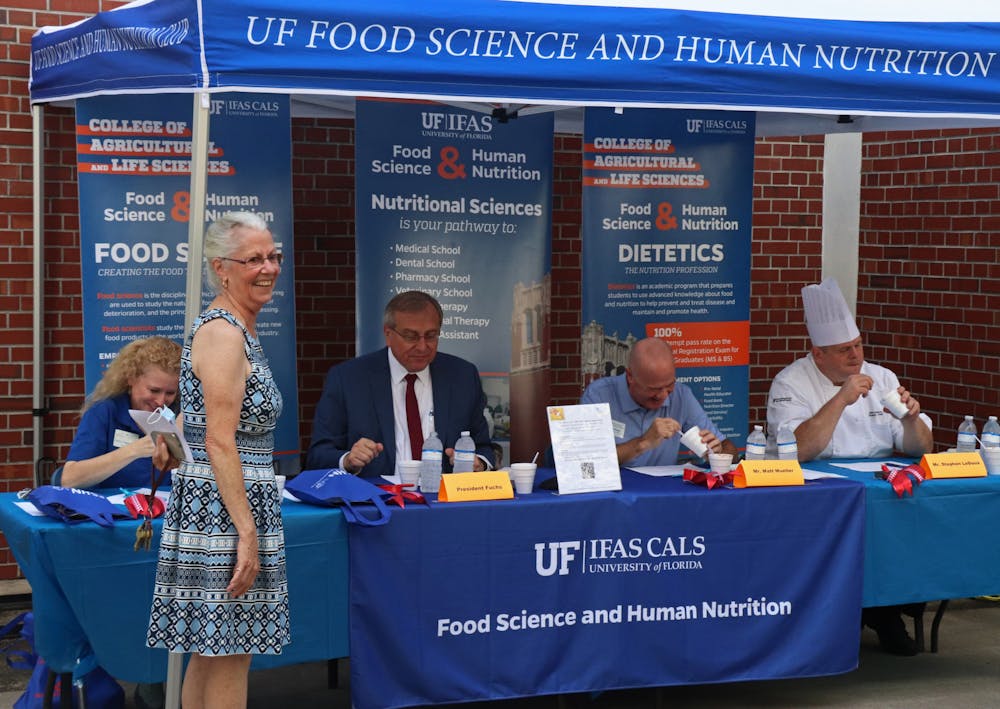Freshly brewed coffee, kombucha and chili were some of the homemade foods and beverages UF students got for free this week.
The Food Science and Human Nutrition Department at UF hosted Food Week, an offering of food-related events to make students aware about the college department.
The department at UF teaches students about dietetics and nutrition. It also conducts agricultural research such as using kombucha to combat citrus disease.
This year marks the fourth consecutive year of Food Week at UF, despite it being over Zoom last year due to the COVID-19 pandemic.
Herschel Johnson, manager of student services for the Food Science and Human Nutrition Department, developed this event to showcase the research activities offered to undergraduate and graduate students within the department.
“A successful outcome would be to have some students identify that our programs have something they see as a valuable path to a productive career and have them change their major,” Johnson said.
The week consisted of several activities including a taste panel, majors and minors fair, food giveaways, a chili cook-off, a dietetics Q&A as well as a Master Chef-style cooking competition.
The first listed event was hosted by UF’s Institute of Food and Agricultural Sciences. The event sparked controversy after it offered a SNAP Challenge to experience poverty.
UF’s IFAS description asked participants to either live on $4 a day for the Florida challenge and $2 a day for the global challenge.
Some took to social media to call the challenge insensitive for offering a simulation of poverty instead of supporting causes to help fight it.
“Academia will always be tone deaf and detached from the real world,” wrote one commenter. “To them it’s just another case study.”
Another commenter pointed out that SNAP is designed as a supplemental assistance program, not a program meant to be the sole source of food.
Susan Percival, department chair of UF’s Food Science and Human Nutrition Department, disagreed with the characterization and said the challenge is meant to bring awareness to the problem.
“[IFAS is] trying to make people more aware of the global and national issues regarding hunger and food systems,” Percival said. “The expected outcome for us doing the challenge was to realize how difficult it is for someone who doesn't have enough to eat.”
Percival said she struggled to keep herself full for 24 hours on her $4 budget. She believes the challenge brought awareness to the difficulties some students face whose hunger worries don’t end like the challenge does.
“I can see where people might think it's silly to do it for 24 hours, but after having done it, it is not silly at all,” she said. “It was very impactful.”
However the program offered many other light-hearted events.
A Master Chef competition event was held Thursday afternoon and pitted nine teams of two to compete using items from the Hitchcock Field & Fork Food Pantry to create the best meal.
Joseph Tinghitella, a 21-year-old political science senior, was one of the students who competed at the Master Chef competition.
Competitors were required to include either chicken or fish in their meals, as well as cauliflower, red cabbage or eggplant, he said.
Despite not winning first place, Tinghitella said all of the students had a fun time and there was no hostility between them.
“I definitely think it should be something that happens at least once a semester,” he said. “I learned how hard it is to cook an actual full meal in a very limited amount of time.”
Contact Maya Erwin at merwin@alligator.org. Follow her on Twitter @MayaErwin3.
Maya is a third-year journalism major at the University of Florida covering university general assignment news for The Alligator. In her free time, Maya loves traveling, spending time with friends and listening to music.






